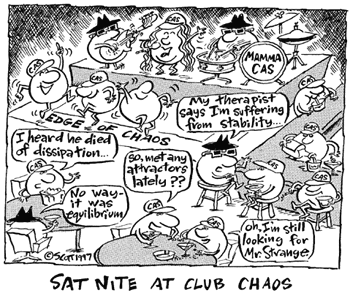
Tales
Managing a living thing
Aides
Reflection
Wicked questions
The inquiry continues
It is normal to finish a paper with a conclusion - to end with a summary of the key points and implications. Yet consistent with both the science of complexity and the state of its development, it seems more appropriate to end with questions. The questions can be viewed from five levels of analysis:
- health care sector
- regional health care system
- institution or organization
- division, department or work group
- individual person.
Some of the questions below are aimed at one of the
levels but most can be used for any level. We invite you to participate with us in this
inquiry as it applies to health care.
Some of the other questions to ponder as you read through this guide are:
- How does co-evolution impact the role of a health care leader? If everything is changing and I am part of that change, how do I plan?
- How can complexity science help us form regional health care systems that are more likely to make a difference?
- If a CAS self-organizes, what is the job of manager or leader of a CAS?
- Can we use ideas of self-organization to unleash the full potential of our staff?
- What is the role of a hospital in the emergent health care system? Can we create the conditions for emergence?
- What do we have to change to improve the quality of our health care system and reduce costs? Can complexity science provide us with any insights to this question?
- How can complexity science improve clinical interventions? For example, how can understanding genetic algorithms improve clinical decision making?
- If a hospital is a CAS, what does this imply about strategic planning?
- Can we use insights from CAS to improve community health and well being?
- If the edge of chaos is the area of greatest innovation, how do we stay on the edge of chaos? What are the risks of staying on the edge?
- What organizational structures, designs, processes etc. are consistent with a complexity science perspective? How would implementing these 'complex' ideas improve health care?
- How can we ensure complexity science enhances and complements proven clinical and
management approaches? Where and when does complexity science add most value? Where are
"traditional" approaches more appropriate?

Previous | Return
to Contents List
All Components of Edgeware Primer Copyright © 2000, Brenda J. Zimmerman.
Schulich School of Business, York University, Toronto, Canada.
Permission to copy for educational purposes only. All other rights reserved.